|
![[Metroactive News&Issues]](/gifs/news468.gif)
[ San Jose | Metroactive Central | Archives ]
![[whitespace]](/gifs/whiteline2.gif) |

Illustration by Winston Smith
Dollars & Sense
In the spirit of the times, we've followed the money this election, stalking its influence from the highest offices in the land right on down to our own local officials.
In firing up a long overdue national debate on campaign finance reform this election, Republican presidential hopeful Sen. John McCain put it this way: "Those of us privileged to hold public office have ourselves to blame for this sickness in American public life. It is we who have squandered public trust, we who have time and again placed our personal and partisan interests before the national interest, earning the public's contempt."
Welcome to Election 2000, otherwise known as: It's the Money, Stupid.
As America has its collective epiphany that money has too much influence over our political system, we decided to trace where most of the cash is coming from in our local and state races.
Sure, we collected opinons on the issues. It's helpful to know where candidates say they stand on things such as traffic, education, environmental preservation, campaign reform and the need for housing.
And then we went straight to the lists of campaign donors. We found that developers make their biggest contributions in districts with lots of open land. That organized labor lines up behind candidates who get to vote on their city and county contracts.
Studies have shown that identifying who is paying to put people in office is a good indication of who will most likely enjoy greater access to and support from them after the election. We thought you should know who they are. Here are our findings--and our voting recommendations, all things considered.
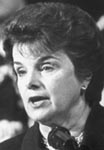 |
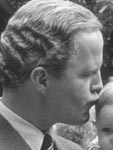 |
Dianne Feinstein, Tom Campbell
U.S. Senate
Unless the sky falls in and the apocalypse cometh, incumbent U.S. Sen. Dianne Feinstein will be the Democratic nominee in this race.
The senator is riding high in the polls and riding in the catbird seat financially. According to the nonpartisan Center for Responsive Politics, she collected close to $5 million in campaign contributions by the end of the year, some $85,000 from Democratic Party organization PACs and another $90,000 from unions. She is a diva for the Demos.
With little reason to spend in the primary, Feinstein will be flush with cash in the fall to take on her Republican opponent.
The real question here is, Which Republican will earn the honor to lose to the popular Feinstein?
Five Republicans of varying credibility are on the ballot: South Bay Congressman Tom Campbell, San Diego County Supervisor Bill Horn, Fremont high-tech entrepreneur Linh Dao, Stockton salesman John Brown, and State Sen. Ray Haynes of Newport Beach.
Campbell, who ran for senate in 1992, is ahead of his lesser-known opponents in opinion polls and fundraising. At the end of 1999, Campbell's campaign boasted having $1.26 million ready to spend--nearly $1 million more than second-place fundraiser Bill Horn had at his disposal.
But even though Campbell has done relatively well shaking the money tree so far, he is refusing donations from PACs, which could hurt his efforts in the fall.
As San Jose voters know all too well, Campbell is an enigma.
He voted to impeach Bill Clinton, but also voted against the re-election of Newt Gingrich to the Speaker's position. He is against affirmative action, but opposes discrimination against gays (including opposition to the Knight initiative).
And despite the fact that Campbell has sponsored a "Can't Vote, Can't Contribute'' bill to limit out-of-state Senate campaign contributions to $100 (individuals from any state can currently give up to $1,000 to a Senate campaign), Campbell has received $70,000 in out-of-state donations to his campaign, according to the Los Angeles Times. (Feinstein has raised some 14 percent of her money from individuals outside of California, but then, she's never made this an issue.)
But even if Campbell hasn't been perfect in our view, the pro-choice moderate is infinitely better than his right-wing opponents.
State Sen. Haynes, for instance, opposes affirmative action, opposes a woman's reproductive freedom of choice, opposes restrictions on handgun licensing and purchase, opposes same-sex marriage, supports public subsidies for private schools. It's a wonderful far-right mix. We'll pass.
Bill Horn, meanwhile, is competing with Haynes for the hearts of social conservatives.
The other two remaining candidates, Linh Dao and John Brown, are relative unknowns with sparse support.
And that leaves us with homeboy Tom Campbell.
Next to Haynes and Horn in the Republican primary, Campbell is far and away the best choice.
Should he win in the primary, Campbell will face an uphill battle against Feinstein.
Vote for Democrat Dianne Feinstein, Republican Tom Campbell.
 Jim Cunneen
Jim Cunneen
U.S. Congressional District 15
Democratic Party leaders think that recapturing this seat--being vacated by Republican Tom Campbell, who is running for Senate--is crucial to winning back control of the House of Representatives. Funny how nobody seemed to want the job of party savior.
Among prominent Dems who turned down the offer were former San Jose Mayor Susan Hammer, Assemblywoman Elaine Alquist, Santa Clara Mayor Judy Nadler and retired Congressman Norm Mineta, who held this seat before.
Even the current establishment choice, Mike Honda, initially refused, preferring to stay in the Assembly and position himself for a state Senate bid. But Honda finally caved in after getting a call from President Clinton and assurances from party leaders and labor that they would back him in the primary. Honda says that party heavies like Rep. Dick Gephardt have promised to donate at least $100,000 to his campaign coffers.
Honda will need all the cash he can get. Portola Valley venture capitalist Bill Peacock, who ran unsuccessfully for U.S. Senate in Missouri in 1992, has loaned $500,000 of his own money to his campaign. That doesn't include $100,000 Peacock says he has received from individual contributors.
Peacock has sunk $426,000 so far into TV ads. He promotes himself as an independent who is not taking any money from PACs, which just doesn't sound that impressive coming from a millionaire.
Lagging far behind in the money game is former Sunnyvale Mayor Robin Parker. At one point last fall, party operatives were actually encouraging Parker, a middle manager at Hewlett-Packard, to run. Those same people, Parker says, tried to persuade her not to run when Honda became the cause célèbre.
If Parker has reason to be bitter, consider teacher Dick Lane. Lane had the party's backing two years ago when no one really took the idea of beating Tom Campbell seriously. Lane boasts that unlike Honda, Peacock and Parker, he actually lives in the district, which extends from San Jose through the West Valley.
Perennial candidate Connor Vlakancic is also on the ballot.
Overall, we are unimpressed by the Demos' five candidates. The party simply hasn't fielded a candidate with good credentials for federal office.
Peacock, a military officer who served in Vietnam, was assistant secretary of the Army under President Jimmy Carter. He also has shown no ambivalence about wanting the job. In fact, he started campaigning when everyone thought incumbent Campbell would seek reelection.
The other top-tier candidates, Honda and Parker, have a decent grasp of local and state government, but they seem a little more fuzzy about Congress. Neither could even correctly identify the current Speaker of the House (Dennis Hastert). Peacock did. And he named Hastert's four predecessors for good measure.
On the Republican side, Assemblyman Jim Cunneen (R-Campbell), a Tom Campbell protégé, faces conservative high-tech attorney Dale Mead. Mead says he wants to give voters a chance to choose someone who isn't a career politician. In this case, we'll stick with the devil we know.
Vote for Republican Jim Cunneen; no endorsement for Democrat.
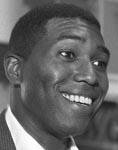 Tony West
Tony West
State Assembly District 23 (San Jose)
More than 30 percent of the voters in the 23rd Assembly District--a goodly portion of which rests in San Jose's Hispanic-heavy east side--have a Latino surname.
That's why leaders of the Latino Legislative Caucus have thus far donated double-digit thousands to their favorite son, San Jose City Councilman Manny Diaz. They are expected to give a lot more.
Diaz, who hopes to succeed outgoing incumbent Mike Honda, also boasts the support of the South Bay AFL-CIO Labor Council and the San Jose Firefighters Association, Local 230, which is in the midst of renegotiating its contract with the city.
Diaz's most prominent opponent is Assistant Attorney General Tony West, who ran unsuccessfully for City Council in 1998. West's inner circle includes his boss, Attorney General Bill Lockyer, the San Jose Chamber of Commerce and the San Jose Police Officers Association. Members of the Black Legislative Caucus have also promised to help West, an African American.
Attorney Fred Buzo, a relative newcomer on the local political scene, is also seeking the Democratic nomination.
Of the three, we like West the best.
Buzo could have a promising future, but he needs to establish a more significant public service record.
Diaz, a former PG&E engineer now in the middle of his second and final term, has hardly distinguished himself among his colleagues. Only two other current council members are endorsing him in this race: Cindy Chavez, who defeated West in 1998, and John Diquisto, a retired firefighter.
By contrast, four council members, including Vice Mayor Frank Fiscalini, are backing West.
West isn't perfect. His fundraising chair is a Sacramento lobbyist named Darius Anderson whose clients include Microsoft, Catellus Development and state gaming interests. Anderson presumably would have great access to West in the Capitol.
And while West promotes himself as an advocate for public education, his stepdaughter attends a private school. West himself has attended some of the nation's finest private institutions: Bellarmine, Harvard and Stanford.
But his Ivy League pedigree also suggests he would be a bright, articulate addition to the Legislature.
Vote for Tony West.
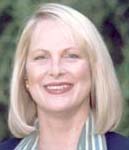 |
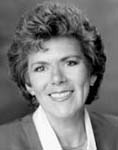 |
Rebecca Cohn, Suzanne Jackson
State Assembly District 24 (West Valley)
The majority of the money and power in the 24th Assembly District comes from the West Valley's technological elite, and the candidate field for Jim Cunneen's 24th Assembly District seat is representative of just that.
With a history of electing anyone with the title "moderate" in front of their respective party, it's little surprise that at least three of the candidates qualify as middle-of-the-roaders.
The Republican Party is lining up behind two candidates, Los Gatos Mayor Steve Blanton and Monte Sereno Mayor Suzanne Jackson. Both Cunneen and Rep. Tom Campbell have hedged their bets and made dual endorsements of these virtually identical candidates.
Jackson, who runs medical seminars with her husband, can also claim the support of the San Jose Police Officers Association, and the Silicon Valley Log Cabin Republicans are also endorsing her.
Blanton, the government affairs director of the Silicon Valley Realtors Association, has received major financial backing from developers, ranchers and $10,000 from the California Real Estate PAC.
The third Republican in the race is conservative soccer mom Donna Court-right, president of the Silicon Valley Taxpayers Association. She has the backing of right-wing groups such as Republicans for Republican Values and the Liberty Caucus, a group of conservative state legislators.
We like Jackson the best of the three GOP candidates.
Courtright is relatively inexperienced politically, and while her loyalty to core Republican values like gun rights and local control may attract the more conservative voters, her support for eliminating carpool lanes and opening up the possibility for statewide concealed-weapon permits puts her out of synch with the 24th District.
Blanton tries to sound like an outsider, but he's really an aspiring career politician. When he first ran for Los Gatos Town Council, he presented himself as a champion of term limits who would serve no more than two terms. In 1998--a year after he lost his bid for county supervisor--he broke his promise and ran for a third time. Now he wants to be a full-time politician in Sacramento.
We applaud Jackson for her role in wresting control of the party's county central committee from right-wingers two years ago. Republicans looking for a capable replacement for Jim Cunneen should vote for Jackson.
On the Democratic side, two candidates are vying for the nomination: management consultant Rebecca Cohn and medical software consultant Steve Glickman.
Glickman, a school board member in Los Gatos for a decade, clearly has a solid grip on many of the problems facing the state and district. But he has limited experience outside of the school systems. He also has eschewed reaching out to other Democrats the way Cohn has. Glickman is financing his campaign and so far has loaned more than $100,000 of his own money toward getting elected.
A quick stint on a town council or board of supervisors may give him the experience--and friends--to be a viable candidate.
Cohn is looking good and is probably the Demos' best shot at taking the seat away from the Reeps. She has lined up virtually every heavy hitter in the state's Democratic Party, and for a political newcomer, she has a lot of promise. While she has never held elected office, she has experience working with the state's political system. She also has thought out positions on a wider variety of issues than any of the other candidates. We recommend a vote for Rebecca Cohn.
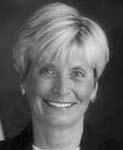 |
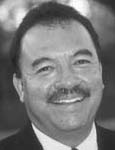 |
Laura Perry, Simon Salinas
State Assembly District 28
The Democratic race for the 28th Assembly District is split between two Latino candidates. Sandra Pizarro, a self-described fiscal moderate, has the backing of the powerful Latino Legislative Caucus as well as a long list of state legislators and Lt. Gov. Cruz Bustamante.
Monterey County Supervisor Simon Salinas has the backing of state Sen. John Vasconcellos as well as strong support in the southern end of the district, which stretches from south San Jose to Soledad.
Pizarro is running to the right of Salinas. She believes in being tough on crime and supports Prop. 21, the juvenile crime initiative. Like just about anyone else running for office in California, she has identified education as her top issue. But she is focusing on higher education, hoping to bring down tuition costs and focus more resources on community colleges.
Salinas is also pushing an education agenda. He takes a softer stance on crime and is the only candidate in this race who has even mentioned health care as a top priority.
Pizarro has been able to pull in support from Sacramento because of her years of experience in the California Assembly Budget Office, and it shows in her fundraising. She's brought in $101,000, much of it from out of the district. Unlike Salinas, she has taken a few large donations from Southern California Indian tribes, who are becoming a bigger force in state politics.
Unions and developers have helped Salinas to be the top fundraiser in the district, with more than $128,000. Little of the money comes from out of the district.
Though Pizarro has worked at the staff level in Sacramento, she has never held elected office. Salinas has worked his way up from a city council seat and has shown his dedication to public service.
Meanwhile, there are two Republicans vying for the seat, attorney Laura Perry and Jeff Denham, who manages a farm produce transport company.
The Liberty Caucus, a group of right-wing Republican lawmakers, has identified this race as one of the make-or-break races for the conservative wing of the party. Those on the far right say the party is being co-opted by moderates, and Denham is one of their most important candidates.
Denham plays down their support, but he is hardly a Tom Campbell Republican. He's backed by state Sen. Pete Knight, of the Knight initiative. He opposes partial-birth abortions but refused to take a blanket position on choice. He supports charter schools. Agriculture and education are his central themes.
Laura Perry is pro-choice. She wants to see increased support for education infrastructure and teachers' salaries and she wants to preserve the district's southern agricultural land.
Despite her backing from incumbent Pete Frusetta, Assemblyman Jim Cunneen (R-Campbell) and the Republican Latino Caucus, Laura Perry has had to loan her own campaign $150,000.
Most of Denham's financial support comes from agricultural interests. Thus far he's at the bottom of the fundraising heap with $52,000.
Though Denham's views are the farthest right in this primary, he comes off as an honest and straightforward candidate.
Perry sat on the United Way board when it nearly went under last year, but says she stuck it out through the crisis and helped to make the organization stronger. She says her experience as a community college trustee makes her more qualified for the position.
Though it is not an enthusiastic endorsement, if Perry has raised concern among conservative Republicans, she must be doing something right.
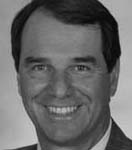 Terry Trumbull
Terry Trumbull
Santa Clara County Supervisor District 5 (North County)
Quick: What is the primary function of county government?
Don't know? Well, don't feel too bad. Most people don't. Not even candidates for county supervisor can correctly answer some basic questions about their future duties.
Metro asked the three District 5 supervisorial candidates the same question: The board of supervisors appoints five staffers who report directly to the board. Name the five positions and the five people currently in those positions. (Sorry folks, no lifelines.)
None of the three candidates scored 100 percent.
Dolly Sandoval, a teacher who has served as a trustee on the Foothill-De Anza College board for eight years, could name only three of the five. Palo Alto Mayor Liz Kniss identified four of the five positions. When Metro told her that the final slot was the public defender, she chimed in, "Of course, it's George Kennedy." Kennedy is the elected district attorney--the county's top prosecutor, not its appointed defense-lawyer-in-chief.
County Planning Commissioner Terry Trumbull, an environmental lawyer, fared best on our test. He named all the positions and current appointees except for current board clerk Phyllis Perez.
The result of our non-standardized test should be no surprise. The guy knows how county government works. That's because Trumbull has served longer than any of his opponents in county government, most recently as an appointee to the planning commission. As a county planning commissioner, Trumbull has stood up to Stanford and pressured the university to preserve open space on its campus.
Obviously, we like Trumbull best. But this was a tough call. All three candidates in this race are credible.
Kniss, a marketing specialist for Sun Microsystems, has logged nearly two decades on the Palo Alto School Board and City Council. We think perhaps she has spent too much time in the rarefied air of Palo Alto and high-tech corporate environs.
Sandoval, meanwhile, boasts the endorsements of three of the four returning supervisors, which shows she could get the needed votes to pass her proposals. She is energetic, personable and bright.
But we're nervous about her close ties to labor, especially SEIU, Local 715--the county's biggest union--which has provided phone-bank centers for her campaign to use. Until the most recent contract agreement, Local 715 leaders have opposed performance evaluations of county employees.
Trumbull has the backing of most local environmental groups, including the Sierra Club. A good bulk of his donations are from other lawyers. Of the three candidates, he would owe the least to developers or organized labor and thus would be an independent representative.
Vote for Trumbull.
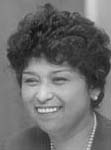 Kathy Chavez Napoli
Kathy Chavez Napoli
San Jose City Council District 2 (South San Jose)
Between juggling Calpine's plans for a power plant and proposed Cisco sprawl, the next council member representing south San Jose's district--which borders New Almaden and Morgan Hill, and includes acres of Coyote Valley's remaining open space--will face major development decisions before settling into City Hall.
So it's no surprise that candidates Forrest Williams and Maria Ferrer have brought in loads of cash from developers like Shapell Industries and Shea Homes--and just about everyone else who stands to benefit from opening up Coyote Valley to residential construction (including landowners like the Sobratos).
Kathy Chavez Napoli stands apart from her competitors in both her funding sources and personal politics.
In the past, Napoli, co-owner of a successful truck-salvage yard in Santa Clara, has largely financed her own campaigns. So far this year she has donated $11,000 to her own cause, though her opponents suspect she'll donate plenty more before March 7.
Napoli's bulldog approach to local politics has earned her some notable detractors--including Mayor Ron Gonzales and his predecessor, Susan Hammer. Napoli made enemies of the two mayors when she helped defeat the 1992 ballpark measure, which would have been financed through a tax hike. Still, Congresswoman Zoe Lofgren is supporting her.
It should be no surprise then that Napoli isn't winning the endorsement game. Gonzales and the Chamber of Commerce are supporting Williams; Hammer and state Sen. John Vasconcellos are backing Ferrer.
More recently, Napoli has earned the scorn of suits working for Calpine Corp. because of her vocal opposition to the company's proposed power plant. Calpine financed a recent poll which Napoli supporters say asked loaded questions designed to make her look bad. (Company officials say they merely tested the credibility of Napoli and other District 2 candidates.)
Napoli was the first of the three candidates to oppose the so-called Metcalf Energy Center. Her early anti-Calpine stance won her the endorsement of the Santa Teresa Citizen Action Group, which represents 6,000 residents opposing the project.
With apologies to council members--who may not appreciate working side-by-side with the south-county spitfire--we think Coyote Valley needs a bold representative who isn't afraid to take a stand.
Vote for Kathy Chavez Napoli.
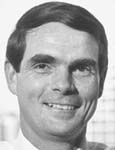 Chuck Reed
Chuck Reed
San Jose City Council District 4 (Berryessa)
In the District 4 City Council race, there are two strong contenders who would be a good addition to the council, each for different reasons.
District 4 is the northernmost district of San Jose, northwest of Mabury Road and Highway 101, taking in the communities of Berryessa and Alviso.
Six candidates are running to succeed Councilwoman Margie Matthews, who is termed out this year.
This is a race where issues have been practically nonexistent, debates and joint appearances have been scarce and sparsely attended, and candidates are running mostly on their own accomplishments and personalities. Four of the candidates don't appear to have much of a chance of winning.
One is Dale Detwiler, a retired electrical engineer whose campaign finance statement is not on record. Both San Jose/Evergreen Community College trustee George Melendez and Santa Clara Unified School District board member Jim Canova are running shoestring campaigns on about a thousand bucks apiece. East Side Union High School District trustee J. Manuel Herrera has raised about $10,000, about half of that in loans, but in a race in which getting your name out to the public is 90 percent of the battle, that amount probably won't cut it.
The clear front-runners are computer engineer and business owner Kansen Chu and environmental lawyer Chuck Reed, each of whom has a lot of positives. Both are bright and articulate. Either of them would make a good member of the San Jose City Council.
If endorsements by public officials were a basketball game, Reed would be an inside-the-paint dunker while Chu would be gunning from outside the three-point line. Reed has the edge in endorsements from City Council members--eight, including incumbent Councilwoman Matthews--as well as Mayor Gonzales. Chu's endorsements from public officials are concentrated outside city government: state Sen. Liz Figueroa; Assembly members Elaine Alquist, Jim Cunneen and Mike Honda; Santa Clara supervisors Don Gage and Blanca Alvarado. No edge either way. All this means is that both candidates are connected players who know the political game in Santa Clara County.
| |
![[Metroactive News&Issues]](/gifs/news468.gif)
![]()



 Jim Cunneen
Jim Cunneen
 Tony West
Tony West




 Terry Trumbull
Terry Trumbull
 Kathy Chavez Napoli
Kathy Chavez Napoli
 Chuck Reed
Chuck Reed